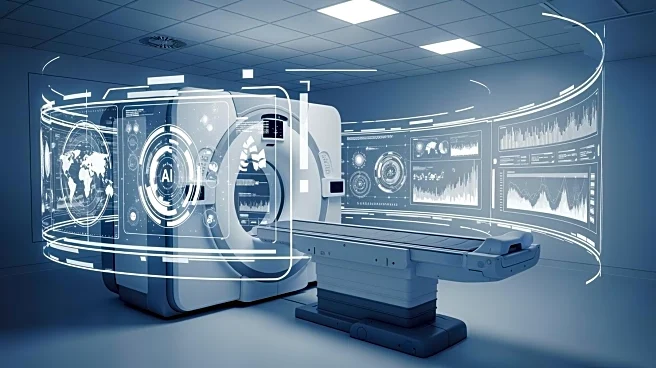What's Happening?
The healthcare industry is moving beyond the initial stages of generative AI implementation, focusing on integrating these models into clinical workflows in a safe, scalable, and operationally sound manner. Andrew Crowder, Vice President of Engineering
at Carta Healthcare, emphasizes the necessity of embedding AI systems that can support complex healthcare environments. These systems are designed to proactively observe, synthesize, and act on clinical data, rather than merely responding to prompts. The integration process involves ensuring that AI models are contextually aware, capable of navigating the vast and complex data generated in clinical settings. This includes the ability to retrieve and analyze structured medication data and other relevant information to provide accurate and useful insights.
Why It's Important?
The integration of generative AI into healthcare is significant as it promises to enhance decision-making processes, improve patient outcomes, and increase operational efficiency. By embedding AI into clinical workflows, healthcare providers can leverage the technology to handle complex data, thus freeing up human resources for more critical tasks. The ability of AI to provide explainable and transparent outputs is crucial for building trust among clinicians, which is essential for widespread adoption. This development could lead to more personalized and precise medical care, ultimately benefiting patients and healthcare systems by reducing errors and improving the quality of care.
What's Next?
As the integration of AI into healthcare continues, the focus will likely shift towards refining these systems to ensure they are tailored to specific clinical environments and workflows. This includes ongoing prompt tuning and maintenance to adapt to evolving AI models. The healthcare industry may also see increased collaboration between AI developers and medical professionals to ensure that AI systems are aligned with clinical needs and regulatory standards. Additionally, there may be a push for more robust guardrails and audit trails to ensure the safety and reliability of AI-driven decisions in clinical settings.
Beyond the Headlines
The ethical implications of AI in healthcare are profound, as these systems must be designed to respect patient privacy and data security. The shift towards AI-driven healthcare also raises questions about the role of human judgment in medical decision-making and the potential for AI to inadvertently introduce biases. Long-term, the successful integration of AI could lead to a transformation in how healthcare is delivered, with a greater emphasis on data-driven insights and preventive care.
















